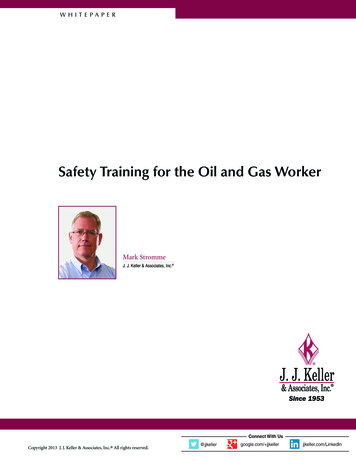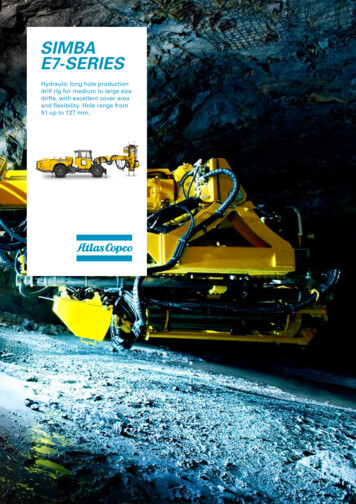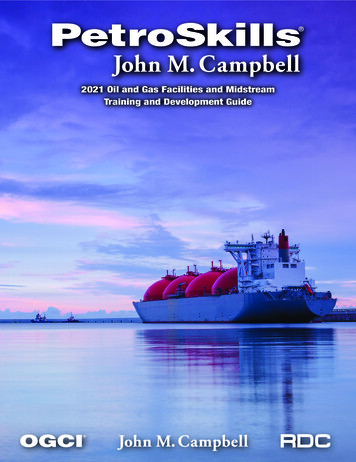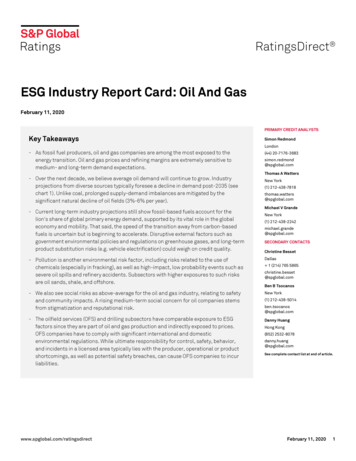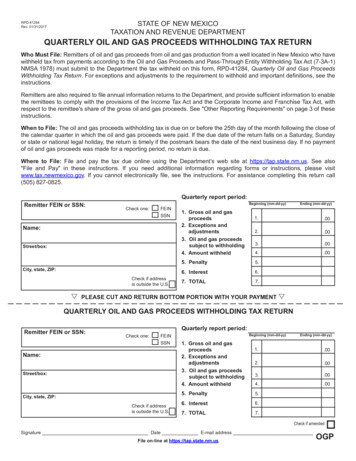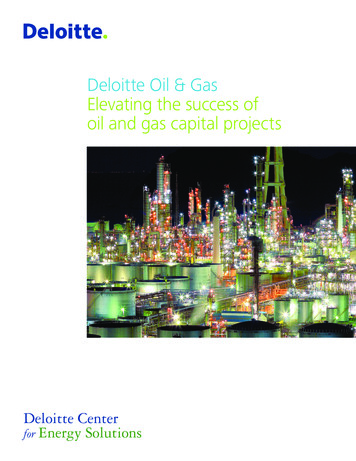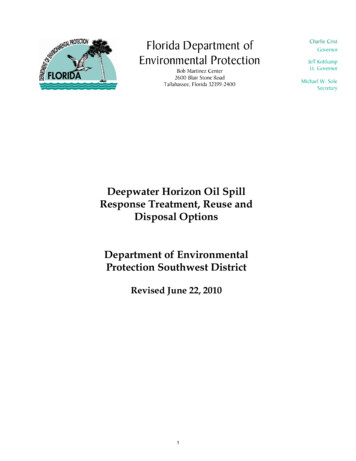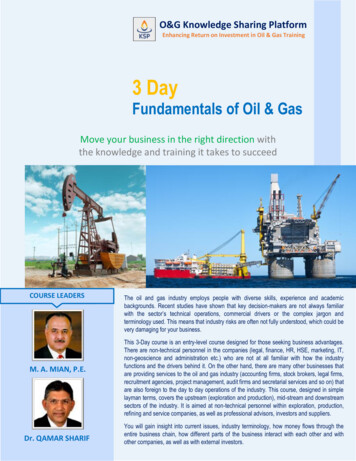
Transcription
O&G Knowledge Sharing PlatformEnhancing Return on Investment in Oil & Gas Training3 DayFundamentals of Oil & GasMove your business in the right direction withthe knowledge and training it takes to succeedCOURSE LEADERSM. A. MIAN, P.E.Dr. QAMAR SHARIFThe oil and gas industry employs people with diverse skills, experience and academicbackgrounds. Recent studies have shown that key decision-makers are not always familiarwith the sector’s technical operations, commercial drivers or the complex jargon andterminology used. This means that industry risks are often not fully understood, which could bevery damaging for your business.This 3-Day course is an entry-level course designed for those seeking business advantages.There are non-technical personnel in the companies (legal, finance, HR, HSE, marketing, IT,non-geoscience and administration etc.) who are not at all familiar with how the industryfunctions and the drivers behind it. On the other hand, there are many other businesses thatare providing services to the oil and gas industry (accounting firms, stock brokers, legal firms,recruitment agencies, project management, audit firms and secretarial services and so on) thatare also foreign to the day to day operations of the industry. This course, designed in simplelayman terms, covers the upstream (exploration and production), mid-stream and downstreamsectors of the industry. It is aimed at non-technical personnel within exploration, production,refining and service companies, as well as professional advisors, investors and suppliers.You will gain insight into current issues, industry terminology, how money flows through theentire business chain, how different parts of the business interact with each other and withother companies, as well as with external investors.
Fundamentals of Oil & GasWhat will this course cover?The course will serve as an orientation to the oil and gas industry. It will provide the jargon used in theindustry, the disciplines involved in finding the oil and gas and bringing all the way to the consumer. Thesteps in finding oil and gas, drilling for oil and gas, field development, production, processing of theproducts, transportation, and storage etc. will be covered. The course will also cover the commercialside of the business.What will you learn?On completion of this course you will be able tofully understand the following: Gain a comprehensive overview ofpetroleum and gas industry operations Confidently master the technical terms:enhance your credibility with colleagues andclients Explore the latest issues in exploration,drilling, production, transportation, storage,product prices, price risk management,world legal systems, economics and muchmore Understand the energy value chain – fromprospect to the burner tip Evaluate the major costs, risks anduncertainties in oil and gas markets andprojects Calculate the maximum sustainablecapacity Explore future trends and innovationsWho will benefit?The following oil & gas company personnel willbenefit from the knowledge shared in thiscourse. Planning managers Non Geoscience engineers Analysts Commercial managers Economists, bankers and stock brokers Government officials Business advisors & business developmentmanagers Asset managers IT, HR and HSE personnel Finance, accounting, auditing, taxation andlegal personnel Administrative secretariesCONTACT US808 W. Boxborough Dr.Wilmington, DE 19810, USATel: 1 (303) 872 0533 Mob.: 966 50 857 3255E-mail: m
Fundamentals of Oil & GasDAY 1General Industry Overview & BasicConcepts Meaning of Petroleum Typical oil & gas companyobjectives Typical oil & gas companyactivities Industry streams Typical organization chart Company structures Petroleum utilizationOil and Gas Geology Origin and formation ofpetroleum Migration of oil and gas Requirements for hydrocarbonaccumulation Hydrocarbon traps Structural trap Stratigraphic trap Geological time scale Typical stratigraphic column Types of hydrocarbons Classification of crude oil Classification of natural gas Typical natural gas composition Properties of gasesOil and Gas Prospecting(Exploration) Geological prospecting Geophysical prospecting Seismic (2D & 3D) acquisition Seismic Processing Seismic interpretation Offshore seismic dataacquisition Onshore seismic data acquisition A seismic section Stratigraphic cross sections Stratigraphic trap Geological time scale Typical stratigraphic column Stratigraphic cross sections Reservoir mappingDAY 2Formation Evaluation & WellCompletion Evaluating a well Whole core and core plugs Open hole logs Cased hole logging Transient well testsWell completions Well completions Barefoot and single wellcompletion Dual well completion Perforating a well Reservoir stimulationReservoir Depletion Mechanisms Solution gas-drive reservoirs Gas-cap drive reservoirs Water-drive reservoirs Combination drive reservoirsOil and Gas Production Facilities Typical oil production facilities Artificial lift systems Purpose of crude treatment Separating and treating wellfluid Treating natural gas Gas processing Gas added value productsOffshore facilitiesTransportation Transporting petroleum fluids Pipeline tariffs Maintenance of Oil and GasFacilities Well servicing and workovers Corrosion and how to avoid itOil and Gas Reserves Reserves estimating methodsand classification Oil and gas reserves estimates Volumetric calculations Decline curve analysis Economic limit Reserves replacement ratioDAY 3Crude Oil Refinery Products &Processes Crude oil refinery Refinery configuration Refinery yields by crude type Refinery margins Refinery margin calculations Factors affecting refinery marginLegal Framework of the Industry The need for collaboration International agreements Parties to petroleumagreements Contractual arrangements Contract documents Upstream project agreement Government take Optimal government take Comparison of fiscal systems Flexible fiscal regimes Why dynamic terms? Joint venture contracts Risk service contracts (Iranianbuyback) Concessionary system's cashflow Production sharing system'scash-flowProject Economics Data required for economics Cash-flow projections Operating expenditure (OPEX) Typical decision yardsticks Characteristics of idealyardsticks Sample before-tax cash-flow Discounted payback period Net present value Internal rate of return (IRR) Profitability index and presentvalue ratio Unit technical cost (UTC) orlong-run marginal cost (LRMC) Investment types Types of investment decisions
Fundamentals of Oil & GasDAY 1Drilling Operations Exploration, delineation,appraisal and developmentdrilling Drilling contracts Different types of Wells Horizontal well technology Routine drilling operations Components of rotary rig Rig's circulating system Functions of drilling mud Rig equipment Drill pipes versus coil tubing Rotary drill bits Rotary core and casing drilling Schematic of a cased well Classification of casing Functions of casing Functions of cement Offshore drilling Mobile offshore drilling rig Well control Special drilling procedures Breakdown of drilling costs Authorization for expenditure(AFE) Technological advancesDAY 2Maximize Ultimate Oil Recovery Reservoir management Recovery sequence Typical well locations in gas-capdrive reservoir Coning of gas from the gas capDAY 3Investment decision-making Service producing investments Uncertainties in oil and gasinvestments Accounting for uncertainties Sensitivity analysisOil Price Risk Management What is oil price riskmanagement? Physical/cash market Forward trading Futures trading Options contracts Sample future prices & optionquotes
Fundamentals of Oil & GasCOURSE LEADERSDr. QAMAR SHARIFM. A. MIAN, P.E.B.Sc in Mining EngineeringM.Sc in Petroleum EngineeringPh.D in Petroleum EngineeringB.Sc. in Mechanical EngineeringM.Sc. in Petroleum EngineeringM.Sc. in Mineral EconomicsDr. Sharif is a petroleum engineering specialist withSaudi Aramco. He has over 35 years of practicalexperience in the oil and gas industry, includingacademia. He has diversified background in drilling,workover and completion operations, research,technology development and implementation, fielddevelopment planning, well cost estimation, contractsand contracting strategy for oil and gas operations. Hestarted his career on a steam-powered rig as a traineedrilling engineer in 1980. He worked as Assistant driller,driller and tour pusher on offshore drilling rigs in AbuDhabi, U.A.E.Mian is a Sr. Petroleum Engineering Consultant withSaudi Aramco in Dhahran, Saudi Arabia. He haspreviously worked with Qatar Petroleum (Doha, Qatar),ZADCO (Abu Dhabi, UAE), Euratex Corporation(Colorado, USA), Keplinger & Associates (InternationalEnergy Consultants in Colorado, USA), and asIndependent Consultant in Colorado, USA. He is aregistered professional Engineer in the state ofColorado, USA.After working 11 years in operations he joined graduateschool and earned his MS and PhD in PetroleumEngineering from Texas A&M University, College Station,Texas. He has a unique blend of hands-on fieldoperations and academic knowledge. He worked withShell International Exploration and Production (SIEP) inHouston and was a recipient of the Shell PresidentAward for premier performance for design andimplementation of multi-string steam injection welldesign at Bakersfield, California.Dr. Sharif has been involved in new joint venturesstartup, product line development, commercializationstrategy for Enventure GT, an Expandable TubularCompany (a JV between Shell and Halliburton). Hedeployed the first expandable casing, downhole.He worked with Shell Nigeria, Farcodus Yokri Project,Warri and reduced well completion time by more than50% for dual completions. He has expertise indeveloping novel ideas and transforming them intorobust and practical solutions. He has been teachingstuck pipe prevention and lost time reduction courseand conducted an awareness campaign for offshoredrilling department. He has been involved in teachingundergraduate and graduate courses at King FahdUniversity of Petroleum and Minerals (KFUPM),Petroleum Engineering Department, Dhahran, SaudiArabia. He brings out the best in his students.Mian has 35 years of diversified experience in petroleumengineering, reservoir engineering, project economicsand decision analysis. He had been involved inevaluating multi-billion dollar oil and gas fielddevelopment, LNG, GTL, Aluminum smelter, refinery,petrochemical, power and production sharing projects.Mian is the author of four books “Petroleum EngineeringHandbook for the Practicing Engineer, Vol. I and Vol. II”and the best seller “Project Economics and DecisionAnalysis, Vol. I and Vol. II,” published by PennWellBooks, Tulsa, Oklahoma, USA. He has also authoredseveral papers in the Oil & Gas Journal, The Log Analyst,World Oil, SPE Journals, and Oil & Gas Financial Journal.He is also the author of three software packages (PEPAC,PEPAC2 and PEPAC3) for petroleum engineers, availablefrom Gulf Publishing Company in USA.Mian is one of the pioneers in working withunconventional gas resources. He has extensively dealtwith reserves evaluation of tight gas and coalbedmethane. Currently he is involved in applying hisexperience to shale gas resources. He has also served asan expert witness in US Federal court and EnergyCommission hearings regarding tight gas pricingclassification in the US.He has delivered lectures in more than 25 countriesaround the globe. He has always received excellentfeedback, as an expert presenter, from participants ofhis courses.
Fundamentals of Oil & GasPlease complete the following Form and e-mail it to mianma@OGKnowledgeShare.com OR Submit the samedetails via the Event Registration on the website www.OGKnowledgeShare.com. We will then send youadditional course details along with a detailed course registration Form.Course NameCourse VenueCourse DateCompanyFirst NameLast NameTitleEmailPhoneAddressCityStatePostal CodeCountryCOURSE FEES AND VENUEMiddle East – US 2,500All Other Locations – US 2,950Hotel accommodation and travel costs are not included in the fees. The Fees includes refreshments, lunch and course material. Course is held preferably in a 5star hotel. The final venue selection will depend upon the number of delegates attending the course and availability of the venue. All delegates will beinformed about the venue two weeks before the course start date.Full payment is due within 14 days from date of invoice and before the course commences. Delegates will not be allowed entry to the course if any paymentsare outstanding. A confirmation letter and invoice will be sent to you on receipt of your booking.You may substitute delegates at any time as long as reasonable advance notice is given to O&G Knowledge Sharing Platform. For any cancellation received inwriting not less than twenty (20) working days prior to the date of the training course, you will receive a full refund less US 150 administration fee and anyrelated bank or credit card charges.Delegates who cancel the registration less than twenty (20) working days of the date of training course, or who do not attend the course, are liable to pay thefull course fee and no refunds will be granted.In the event that KSP cancels or postpones the course for any reason, the delegates will be given choice to (a) request full refund less applicable credit card orbank charges, (b) attend the same course at the rescheduled date at the same or other venue or (c) receive credit note to be used by any employee of thesame company for any other course offered by KSP, which must occur within one year from the date of postponement.CHARGES AND FEES1.2.For Payment by Direct Telegraphic Transfer, client has to bear both local and oversea bank charges.For credit card payment, there is additional 4% credit card processing fee, which shall be added to the course fee.COMPANY GUARANTEEIf Company Payment is selected as the Billing Method, an official letter from the company, signed by HR or responsible Management, stating names of thedelegates who will attend the course and the total course fee payment guaranteed by the company to be paid within 30 days upon receipt of invoice from O&GKnowledge Sharing Platform shall be submitted ten (10) working days before the start date of the course.
The course will serve as an orientation to the oil and gas industry. It will provide the jargon used in the industry, the disciplines involved in finding the oil and gas and bringing all the way to the consumer. The steps in finding oil and gas, drilling for oil and gas, field development, production, processing of the


